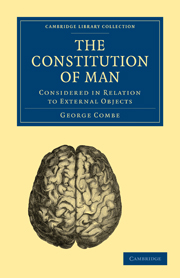Book contents
- Frontmatter
- PREFACE
- Contents
- CHAPTER I ON NATURAL LAWS
- CHAPTER II OF THE CONSTITUTION OF MAN, AND ITS RELATIONS TO EXTERNAL OBJECTS
- CHAPTER III TO WHAT EXTENT ARE THE MISERIES OF MANKIND REFERABLE TO INFRINGEMENTS OF THE LAWS OF NATURE
- CHAPTER IV ON THE COMBINED OPERATION OF THE NATURAL LAWS
- CONCLUSION
- APPENDIX
CHAPTER III - TO WHAT EXTENT ARE THE MISERIES OF MANKIND REFERABLE TO INFRINGEMENTS OF THE LAWS OF NATURE
Published online by Cambridge University Press: 29 August 2010
- Frontmatter
- PREFACE
- Contents
- CHAPTER I ON NATURAL LAWS
- CHAPTER II OF THE CONSTITUTION OF MAN, AND ITS RELATIONS TO EXTERNAL OBJECTS
- CHAPTER III TO WHAT EXTENT ARE THE MISERIES OF MANKIND REFERABLE TO INFRINGEMENTS OF THE LAWS OF NATURE
- CHAPTER IV ON THE COMBINED OPERATION OF THE NATURAL LAWS
- CONCLUSION
- APPENDIX
Summary
In the present chapter, I propose to inquire into some of the evils that have afflicted the human race; also whether they have proceeded from abuses of institutions benevolent and wise in themselves, and calculated, when observed, to promote the happiness of man, or from a defective or vicious constitution of nature, which he can neither remedy nor improve.
Sect. I.—CALAMITIES ARISING FROM INFRINGEMENTS OF THE PHYSICAL LAWS.
The proper way of viewing the Creator's institutions, is to look, first, to their uses, and to the advantages that flow from observance of them; and, secondly, to their abuses, and the evils consequent thereon.
In Chapter II, some of the benefits conferred on man, by the law of gravitation, are enumerated; and I may here advert to the evils originating from that law, when human conduct is in opposition to it. For example, men are liable to fall from horses, carriages, stairs, precipices, roofs, chimneys, ladders, masts, to slip in the street, &c. by which accidents life is frequently altogether extinguished, or rendered miserable from lameness and pain; and the question arises, Is human nature provided with any means of protection against these evils, at all equal to their frequency and extent?
The lower animals are equally subject to this law; and the Creator has bestowed on them external senses, nerves, muscles, bones, an instinctive sense of equilibrium, the sense of danger, or cautiousness, and other faculties, to place them in accordance with it.
- Type
- Chapter
- Information
- The Constitution of ManConsidered in Relation to External Objects, pp. 101 - 260Publisher: Cambridge University PressPrint publication year: 2009First published in: 1828



